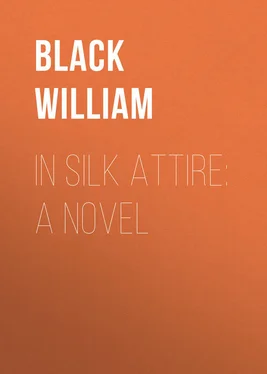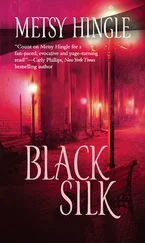William Black - In Silk Attire - A Novel
Здесь есть возможность читать онлайн «William Black - In Silk Attire - A Novel» — ознакомительный отрывок электронной книги совершенно бесплатно, а после прочтения отрывка купить полную версию. В некоторых случаях можно слушать аудио, скачать через торрент в формате fb2 и присутствует краткое содержание. Жанр: foreign_antique, foreign_prose, на английском языке. Описание произведения, (предисловие) а так же отзывы посетителей доступны на портале библиотеки ЛибКат.
- Название:In Silk Attire: A Novel
- Автор:
- Жанр:
- Год:неизвестен
- ISBN:нет данных
- Рейтинг книги:4 / 5. Голосов: 1
-
Избранное:Добавить в избранное
- Отзывы:
-
Ваша оценка:
- 80
- 1
- 2
- 3
- 4
- 5
In Silk Attire: A Novel: краткое содержание, описание и аннотация
Предлагаем к чтению аннотацию, описание, краткое содержание или предисловие (зависит от того, что написал сам автор книги «In Silk Attire: A Novel»). Если вы не нашли необходимую информацию о книге — напишите в комментариях, мы постараемся отыскать её.
In Silk Attire: A Novel — читать онлайн ознакомительный отрывок
Ниже представлен текст книги, разбитый по страницам. Система сохранения места последней прочитанной страницы, позволяет с удобством читать онлайн бесплатно книгу «In Silk Attire: A Novel», без необходимости каждый раз заново искать на чём Вы остановились. Поставьте закладку, и сможете в любой момент перейти на страницу, на которой закончили чтение.
Интервал:
Закладка:
"Undoubtedly, if she chooses to accept it."
After a few moments' silence, the prudent and tender mother having calculated every possibility which might affect her daughter's happiness, she said to him:
"In that case, sir, I can always provide against her suffering want. I will give her to-day your address in England, and tell her that if at any future time I am taken from her, and if she should ever be in need, she can go to you; and then, sir, you will remember who Annie Brunel is."
"And you absolutely condemn your daughter to be an actress, when a word from you could make her an English lady – "
The woman before him drew herself up.
"When my daughter ceases to believe that an actress may be a lady, it will be time for her to apply to you for the rank she has lost."
CHAPTER IV.
THE ACTRESS
It was near midnight when an unusually notable and brilliant little party sate down to supper in the largest hall of an hotel in the neighbourhood of Charing Cross. Brilliant the meeting was, for beneath the strong lights shone the long white table with its gleaming crystal, and silver, and flowers; and notable it was in that the persons sitting there were, every one of them, marked by an obvious individualism of face and dress. They wore no mere company of cultivated nothings, as like each other in brain, costume, and manner, as the wine-glasses before them; scarcely a man or woman of them had not his or her own special character rendered apparent by this or that peculiarity of facial line or intentional adornment.
But there was one woman there – or girl, rather, for she was clearly not over twenty – whose character you could not easily catch. You might watch the expression of her eyes, listen to her bright, rapid, cheerful talk, and study her bearing towards her associates; and then confess that there was something elusive about her – she had not exhibited her real nature to you – you knew nothing of her but those superficial characteristics which were no index to the spirit underneath.
Slight in figure, and somewhat pale and dark, there was nevertheless a certain dignity about her features, and a stateliness in her gestures, which gave an almost massive grandeur to her appearance. Then her magnificent black hair lay around the clear, calm face, which was rendered the more intensely spiritual by large eyes of a deep and tender grey. They were eyes, under these long eyelashes, capable of a great sadness, and yet they were not sad. There seemed to play around the beautiful, intellectual face a bright, superficial, unconscious vivacity; and she herself appeared to take a quite infantine interest in the cheerful trivialities around her. For the rest, she was dressed in a gleaming white moiré , with tight sleeves which came down to her tiny wrists, and there ended in a faint line of blue; and through the great braided masses of her black hair there was wound a thick cord of twisted silver, which also had a thread of blue cunningly interwoven with it. The artistic possibilities of her fine face and complexion were made the most of; for she was an artist, one of the few true artists who have been seen upon our modern stage.
This was Miss Annie Brunel, who in three months from the date of her arrival in this country had won the heart of London. The young American actress, with her slight and nervous physique, her beautiful head, and the dark lustre of her eyes, was photographed, lithographed, and written about everywhere: people went and wept covertly beneath the spell of her voice; for once unanimity prevailed among all the critics who were worth attention, and they said that the new actress was a woman of genius. Who could doubt it that had witnessed the utter self-abandonment of her impersonations? She did not come upon the stage with a thought about her jewellery, a consciousness of her splendid hair, and an eye to the critical corner of the stalls. On the stage she was no longer mistress of herself. Her eyes deepened until they were almost black; her face was stirred with the white light of passion; and her words were instinct with the tenderness which thrills a theatre to its core. When the sudden intensity died down, when she resumed her ordinary speech and dress, she seemed to have come out of a trance. Not a trace remained of that fire and those intonations, which were the result of unconscious creation; her eyes resumed their serene, happy indifference, her face its pleased, childlike expression. Swift, active, dexterous she was, full of all sorts of genial and merry activities; that kindling of the eye and tremor of the voice belonged to the dream-life she led elsewhere.
The supper was rather a nondescript affair, resembling the little entertainment sometimes given by an author on the production of his new piece. As the play, however, in which Miss Brunel had just appeared was "Romeo and Juliet," there was a little difficulty about the author's being present to perform the ordinary duties; and so the manager's very good friend, the Graf von Schönstein, had stepped in and offered to play the part of host on the occasion.
The Graf, indeed, occupied the chair – a large and corpulent man, with a broad, fair face, small blue eyes, red hands, a frilled shirt, flowered waistcoat, and much jewellery. He had made the acquaintance of Miss Brunel during the previous year in America, and lost no time in renewing it now that she had so suddenly become famous in England. Of the Graf, who it may be mentioned was once a respectable tea-broker in Thames Street, E.C., we shall hear more.
On the left of the chairman sate the manager, a middle-aged man, with grey hair and a melancholy face; on the right Miss Brunel, and next to her a young man of the name of Will Anerley, a friend of Count Schönstein. Then followed several members of the company, an elderly little woman who officiated as Miss Brunel's guardian, two or three critics, and a young man who spoke to nobody, but kept his eyes intently fixed upon a charming soubrette (with whom he had quarrelled some days before) who was wickedly flirting with Mercutio. There was no lack of jest and talk down both sides of the table, for the wine-glasses were kept well filled; and occasionally there rang out, clear and full, the mellifluous laughter of the Nurse – a stout, big, red-faced woman, who had a habit of using her pocket handkerchief where a table-napkin might have been more appropriate – as she cracked her small jokes with Benvolio, who sate opposite to her. Then Friar Lawrence, who had thrown aside his robe and become comic, happened to jolt a little champagne into Lady Capulet's lap; and the angrier she grew over his carelessness, the more did the people laugh, until she herself burst out with a big, good-natured guffaw.
Meanwhile the small clique at the upper end of the table was engaged in a conversation by itself, Count Schönstein appealing to the manager vehemently:
"Was I not right in begging you to give the public Miss Brunel's 'Juliet?' There never was such a triumph, Miss Brunel; I assure you, you have taken London by storm. And with the public satisfied, will the critics object? You will not see a dissentient voice in the papers on Monday morning. What do you say to that, Mr. Helstone?"
The man whom he addressed had forsaken the cluster of his brother critics, and was busily engaged in amusing the pretty soubrette , whom he had entirely drawn away from poor Mercutio.
"Why," he said, with a faint smile, apparently bent upon puzzling the gorgeous-looking gentleman who had imprudently interrupted him, "I should be sorry to see such unanimity, for Miss Brunel's sake. Conscientious journalism, like every conscientious journalist, knows that there are two sides to every question, and will do its best to write on both. The odds will be the truth."
Читать дальшеИнтервал:
Закладка:
Похожие книги на «In Silk Attire: A Novel»
Представляем Вашему вниманию похожие книги на «In Silk Attire: A Novel» списком для выбора. Мы отобрали схожую по названию и смыслу литературу в надежде предоставить читателям больше вариантов отыскать новые, интересные, ещё непрочитанные произведения.
Обсуждение, отзывы о книге «In Silk Attire: A Novel» и просто собственные мнения читателей. Оставьте ваши комментарии, напишите, что Вы думаете о произведении, его смысле или главных героях. Укажите что конкретно понравилось, а что нет, и почему Вы так считаете.












